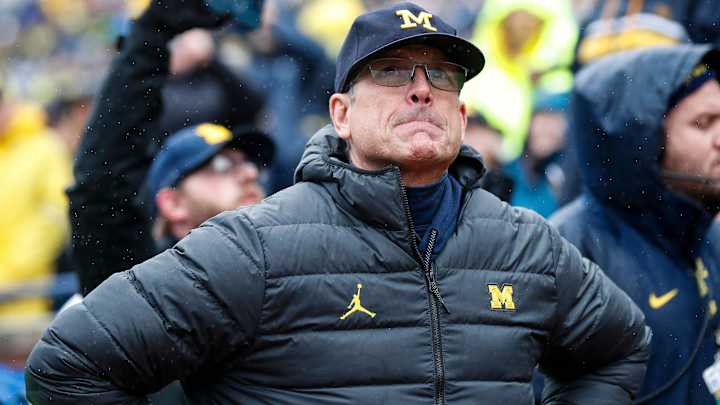Michigan’s ‘Sign-Stealing’ Scandal Is a Cautionary Tale for the NFL

Happy Friday, NFL. College football is embroiled in a cheating scandal that makes Spygate look as innocent as a game of Stratego, and while that may seem like the ideal time to kick your feet back and laugh about what color ties university presidents will wear to their congressional hearings, it should be a call to action. Namely, a reminder to take a stroll through your own internal intelligence to make sure your closets are clean.
In case you missed it, the Michigan football program allegedly employed a former military captain to aid in its effort to decipher and steal opposing teams’ signals, ESPN reported Friday, with Yahoo Sports first reporting the NCAA’s investigation into the program. That’s a wild fact to take in, but, for me, the more stunning part is the lack of surprise from the college football world in general.
Pat Narduzzi, the coach at Pitt, said that it “definitely happens” all the time and that he would like the NCAA to stop it. One could make the case that Greg Schiano, the coach at Rutgers, was telling the world about it during a halftime interview. For years, college football coaches have obscured themselves with sheets or other obstructive devices to protect their play calls from being intercepted from the press box. Here’s an article about Western Kentucky doing it in 2019. Western Kentucky!

Regardless of whether this scandal was unearthed due to a legitimate concern or whether Jim Harbaugh was due for a political elbow to the chin for going too hard in the paint, it is undoubtedly the tip of the iceberg. Sign-stealing, deciphering, collecting and disseminating is the worst-kept secret in the sport, just like it was in baseball before the Astros’ trash-can-walloping completely sapped our remaining respect for a sport that had been slowly dying since the steroid era.
In his book Winning Fixes Everything, Evan Drellich, who broke the news of the Astros’ sign-stealing scandal, consistently notes the failure of Major League Baseball to act. There were myriad opportunities to shut down the misuse of technology and the recruitment of low-level staffers as faux Navy SEALS as a means to procure an advantage. Instead, they were left with an earth-shattering controversy that made a mockery of the sport. One could argue baseball is in a better place now that it was forced to confront reality, but how much more valuable would preventive action have been? If it really was naivete, fine. Now we know to what lengths people will go to win. Now there is no excuse.
Which is where the NFL comes in today. Right now. This very moment.
To be clear, let’s back up and note that sign-stealing in the NFL is way harder than it is in the NCAA. In college football, there is no coach-to-quarterback wireless communication. Everything is conveyed to the field via signal. If a team wants to play with tempo (and, like, every college football team does), it necessitates the use of a signal. No one huddles. To have someone, such as Michigan allegedly did, potentially surveying a sideline at an intimate distance and noting the intricacies of the operation, it would be able to completely short-circuit an entire play-calling system. If talent is equal, losing that game would be next to impossible.
Since Spygate, the ruling on how teams are able to intercept opposing teams’ signals is crystal clear. But does that mean that everyone has fallen into line, or does that mean that teams have just gotten more creative and evolved, much like the Astros did? Just a few years ago, the Patriots, post-Spygate, were fined $1.1 million and a third-round pick for this exchange in the Bengals’ press box. While the Patriots’ cameraperson denied this, one could see how they could have used the media arm of their operation as a way to “incidentally” collect valuable information.
That’s the task at hand for the NFL this weekend, this month, this year. This is not an allegation, to be clear, but a plea. The pressures to win at the highest levels of NCAA football are trumped by only the pressures to win at the NFL level. Just look at the way teams behave above board, in public, and the clear sense of desperation that it conveys. Now, NFL, ask yourself: Is it likely or, even probable, that there might be something else out there?
In some ways, it’s easier to allow a scandal to emerge on the surface like some piece of flotsam and then exterminate it publicly like a real-life Ghostbuster. But the NFL has its tentacles everywhere now. A cheating scandal on the scale of Michigan may not derail the NFL machine or even force it to skip a beat. And again, there may be nothing to look at. There may be an ongoing effort that is so good at combating these issues that they’ll never make it to the public view and the very thing we’re asking for has been underway since Spygate. But it’s absolutely worth double-checking, isn’t it? Bolstering? Revisiting? Especially now that the consequences of ignorance, even incidental ignorance, are apparently on display.
